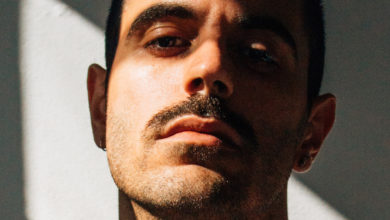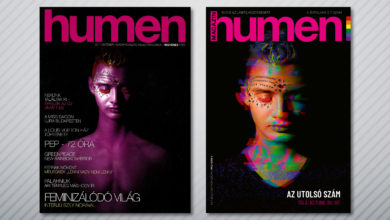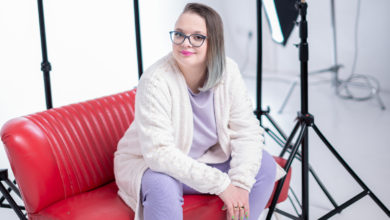„I had to go through the AIDS stage with my 5-year-old daughter”
One of Hungary’s most prominent LGBTQ organization, Háttér Társaság organizes a community gathering for people living with HIV every two weeks. The casual discussions are open to everyone affected. Our monthly column ‘Positive Outlook’ (Pozitív Szemmel) features regular participants who are open to sharing their stories with our readers.
In the spring of 2016, Éva was diagnosed with encephalitis at the infectology department of the Szent László Hospital in Budapest. It was the final episode of a two-year-long health care nightmare. She had already been suffering from hair loss, eczema, shingles and fungal infection, and by the time of her diagnosis, she had virtually no white blood cells left and even fainted once. At one of the visits, in addition to her regular doctor, department head Dr. János Szlávik also showed up and told Éva that her HIV test came back positive.
“So I’m going to die now,” the thought ran through her head. Éva knew nothing about the virus at the time other than the shocking news segments about Freddie Mercury and the scenes of Philadelphia. She was sure the diagnosis was equivalent to a death sentence; therefore, she was quite shocked at Szlávik’s words: “In 3 months you will be as healthy as I am. In fact, you will be able to have another baby.”
Nevertheless, her immune system was collapsing at the time. She was hospitalized in the AIDS stage with a CD4 count of 78 (compared to between 500 and 1,500 in a healthy person). She was terrified. She didn’t know if she would ever be able to continue as a teacher, and she had no idea what awaited her five-year-old daughter. Dorka also had to be tested because it was not clear whether Éva was HIV-positive when she gave birth to her. The little girl was taken to the hospital by her grandpa to take a quick test. Éva didn’t take her eyes off the test for a quarter of an hour, waiting for the result. Dorka was HIV-negative.

Éva has heard about a mother whose HIV infection was discovered in a similar way. In that case, however, her children also became infected during childbirth. Today she lives completely isolated from the world. Éva is sure that her life would have ended symbolically if Dorka turned out to be positive. She thinks of this story as if there was an imaginary basket with two balls in it, and the other mom garbbed the one with HIV before her and she got the non-HIV one.
In Hungary, an extremely low proportion of heterosexuals get tested for HIV at least once in their lives. There are mothers who are diagnosed with HIV by first finding out about their child around the age of 1-2, when they are also tested for HIV due to being constantly sick and weak. Dorka was conceived in a one-night-stand, her father was a black man. Éva does not deny that she had her prejudices. She insisted on being tested when she was a few months pregnant, but her doctor was shocked at her request and reassured her: why would she need it anyway? So Éva let go of the matter.
“Anyway, it’s embarrassing to ask for such a test. People are afraid of the outcome, no one wants this stigma. Because you are a woman, the doctor assumes that you have only slept with one man, your husband, all your life.” And the expectant mother then tends to leave her doctor in this belief, because whoever asks for HIV testing is assumed to be a prostitute, or at least accused of having an unacceptably high number of partners.
Éva has believed for a long time that she was infected by Dorka’s biological father, whom she met for the first and last time on the night of her daughter’s conception. However, before that, she had an on-and-off relationship with another man called Laci for nearly two decades. She had been living with HIV for nearly a year when they met again in 2017 at Laci’s apartment. She recognized boxes of HIV drugs on one shelf. She questioned the man, who said he was hospitalized in 2013, similarly in the AIDS stage (his CD4 count was 9), but neither then, nor later did he have the courage to notify Éva. She realized thus that she was already infected when Dorka was conceived, and she considers it a miracle that the little girl still came into the world as HIV-negative. Even during the two-and-a-half-year period of breastfeeding, she did not transmit the virus to her.
Éva spent two weeks at the infectology department. She should have stayed for four, but as a single mother she was released earlier. “I had to go through the AIDS stage with my 5-year-old daughter.” She took eight pills a day: four in the morning and four in the evening. She was told there will be side effects, but she was not informed about them in detail. “I am praying for forgetting the name of the medications one day.” She remembers the weeks and months that followed (it was in late spring and summer of 2016) as if she was suffering from a constant hangover mixed with chemotherapy-induced malaise. She weighed less than 50 kilograms and couldn’t get out of bed. Together with her daughter, she temporarily moved in with her parents because she was unable to care for the child. She couldn’t even open a bottle of mineral water.
After a while, she started seeing in color again, and objects were not just blurry spots anymore. “It seemed as if a thick veil has been lifted.” She had to take eight pills a day for about half a year, after which their number was halved. She had weekly check-ups until a major milestone when her CD4 count jumped from 78 to 134. she felt calm for the first time in months. She struggled hard, hoping to regain her health. That autumn, she felt for the first time that the few hundred meters-distance between the Nagyvárad tér metro station and Szent László Hospital was not endless. She also went back to work when school started in September, although that wasn’t easy either. She was regularly dizzy, and always kept biscuits in her bag as an emergency snack. She suffered from fever on weekends and at nights she had difficulty sleeping.
Today, roughly a dozen people know that Éva lives with HIV. Family members, the school principal, colleagues, friends. There were those who blushed embarrassedly, some who could not hide their resentment, and even a few who were terrified. There was also someone to whom she shouldn’t have spoken about it. But why did she tell anyway? “It was such a relief to talk to people about it. I no longer have to fear that it will be revealed against my will. There was a doctor who said if I tell people about my condition, I can’t teach anymore and my child will be ostracized by the community. Maybe it was an exaggeration. Maybe that doctor was prejudiced against society. But there is no doubt that people in Hungary are uneducated about HIV, and in some cases, this creates specific disadvantages. It could even mean a threat for me.”

As for Dorka, she knows that her mom is taking medicine in order to strengthen her immune system and not get sick. She also knows that if Mom didn’t take the pills, she would die. Her memories from four years ago go as far as her grandfather taking her to the hospital, where she was pricked with a needle.
Éva has even found love again. She has known Ádám since the age of six, they were classmates in elementary school. They started talking and meeting again a few years ago, but she didn’t talk about her illness for a while. Looking back, it wasn’t even the story of HIV that was hard to share with him, but the things she had to go through between 2014 and 2016 alone with her little daughter.
Eventually the “coming out” came spontaneously, when they were just sitting in the car. “I want to say something,” Éva began, sincerely afraid Ádám would throw her out of the car once he heard the news. His partner thought she was joking at first, but then he saw in her eyes that this was not the case. He did stop the car, but only so they could talk it through in peace and quiet. Ultimately, Ádám was on the opinion that Éva was amazingly brave.
Today, after four years, Éva feels she has accepted her condition. It became part of her identity. In November 2019, it was time for her to join the ‘Positive Outlook’ community. “We set out on the path to becoming an association. Today, there are about 3,000 registered people living with HIV in Hungary. Most of them live in complete isolation. Many of them do not have access to vital information, and they have to face the upcoming challenges on their own. However, every 3 months they all turn up at the clinic. That’s why we decided to refurbish the waiting room in December. We brought pillows and curtains, and wrote messages on the wall to change the mood. We debated a lot about what to put up there, we even had a huge fight about is. Eventually, we reached an agreement. My quote was: ‘Did you know that the largest schools of sardines are even detected by satellites?’ Some people were confused by this statement, but I just wanted to express that if we are joined in unity, they can’t deny our existence. It’s a tiny achievement, but the waiting room’s atmosphere is undeniably less depressing. Additionally, it encouraged two of our peers to join.”
Éva is one of those who spares no time or energy in founding an association to help people living with HIV, whose goals include helping patients with mental and practical issues, tackling prejudice and stigmatization, doing outreach work, and prevention. “In Hungary, 10-13 people die of AIDS every year, while it could be turned around so easily.” If she could, she would make HIV testing mandatory for all expectant mothers as a start. “This disease has brought a lot of positive changes to my life, but it would be nice if no one else had to go through this.”
Positive Outlook – About you. With you. For you.
Do you live with HIV and want to be part of a community? Come to a community event organized by Háttér Társaság every Friday night! For more information, visit Háttér Társaság’s Facebook event named „Pozitív Szemmel – önsegítő csoport” or the organization’s website (available only in Hungarian).
Dániel Waliduda
Instagram: @waliduda






